

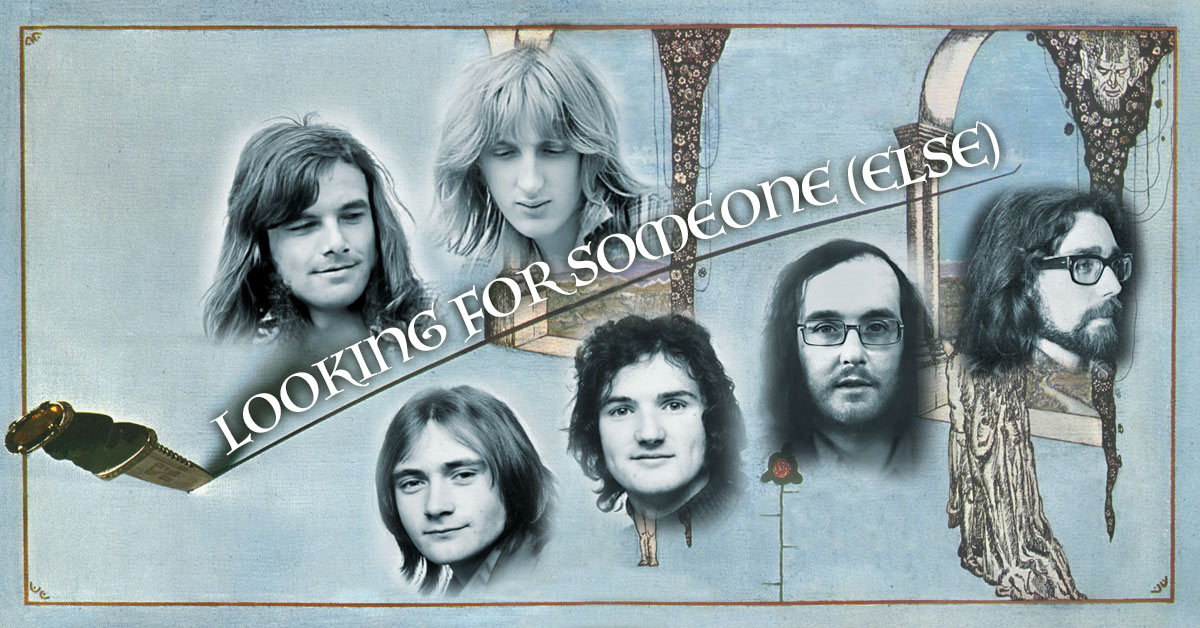
What you read here is told from the perspective of the protagonists. This may not always coincide with the memories of other people involved, but it is told as the individuals remember it. Sometimes a memory can shape a person's life, while the others involved may have long since forgotten the incident (loosely based on Phil Collins from his book Not Dead Yet).
England, mid-1970, exciting times
…Phil Collins would later say this when he spoke about joining Genesis [1].
These were indeed eventful times for Genesis, which began on 18 July 1970 in Haywards Heath and came to an end in January 1971.
Anthony Phillips and John Mayhew
It was a hot day in the south of England [2]. Five young men had just finished their concert at the Sussex Hall in Haywards Heath, when afterwards their guitarist declared his official departure from the band, although he had already made the decision to leave a few weeks earlier [3].
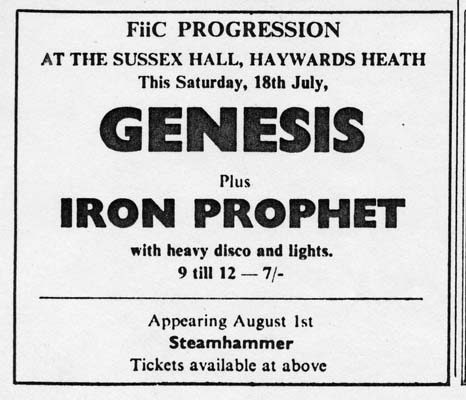 An everyday occurrence in music business, one might think. But for the then still relatively unknown band Genesis, it was a profound turning point.
An everyday occurrence in music business, one might think. But for the then still relatively unknown band Genesis, it was a profound turning point.
Anthony Phillips, the guitarist and founding member of Genesis, was plagued by stage fright and says: „For me, when the band went on the road things began to go wrong and I think I realised at that point that this just wasn't the life for me. The fact that we all lived together in the same cottage probably didn't help after a while. It was great fun in an idealistic way but actually not terribly sensible for people getting on. I just found that the pressure of the whole thing got to me after a while as we had all these gigs where agents were coming along and I thought "I'm not sure I can deal with this“." [4]
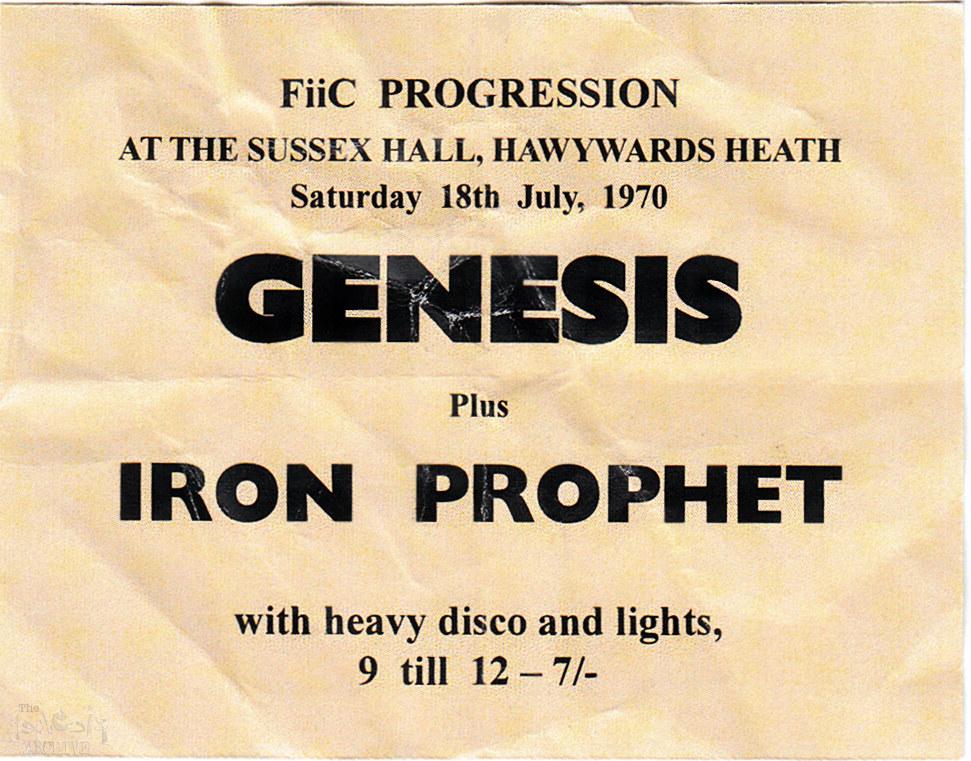 At this point, Genesis was on the verge of disbanding, which shows how important Ant was to the group.
At this point, Genesis was on the verge of disbanding, which shows how important Ant was to the group.
On the way back from Haywards Heath, however, Peter Gabriel and Mike Rutherford argued in favour of continuing without Anthony Phillips. Tony Banks agreed, but he wanted to find a new drummer who was more creative and had more fire than John Mayhew, their current drummer [5]. And so it was that a short time later the band asked John to leave Genesis [6].
Things picked up speed when the following advertisement by Tony Stratton Smith appeared in Melody Maker on 1 August 1970:
The 19-year-old Philip David Charles "Phil" Collins, who (according to himself) bought the latest music magazines from his newsagent every Thursday [although dated each Saturday, the music press went on sale a few days earlier, editor's note] (here on 30 July 1970), was still playing with Flaming Youth at the time. However, he was always on the lookout for new jobs and so the framed advert caught his eye.
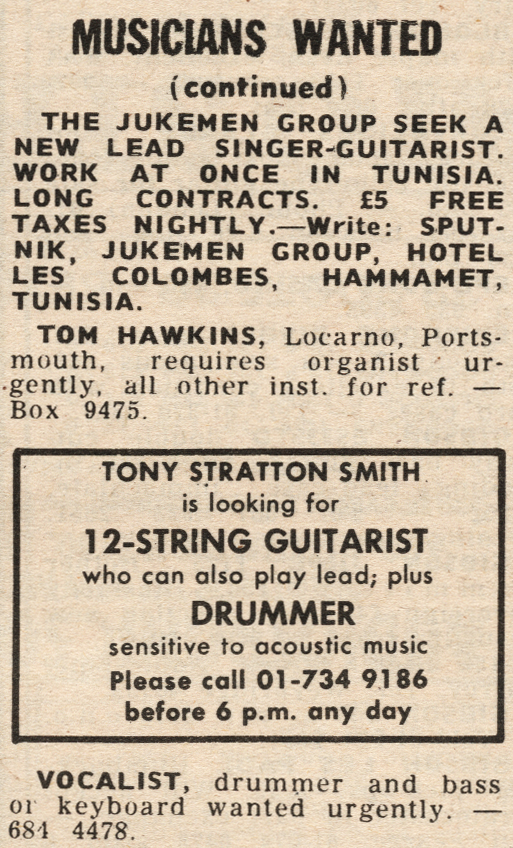 As he felt that he was the ideal candidate and also knew Tony Stratton Smith, he went to the Marquee Club in London the next evening (Friday 31 July 1970) to meet him there. When asked who the band was, he replied that they were called Genesis and that Phil would have to get in touch with these guys himself. [6a]
As he felt that he was the ideal candidate and also knew Tony Stratton Smith, he went to the Marquee Club in London the next evening (Friday 31 July 1970) to meet him there. When asked who the band was, he replied that they were called Genesis and that Phil would have to get in touch with these guys himself. [6a]
In fact, Phil rang Peter Gabriel and brought himself and his friend from Flaming Youth, Ronnie Caryl, into the conversation. And so they were invited to audition at Peter Gabriel's parents' house.
At this point, our schedule differs from the one often described. We believe that the audition did not take place a week later, on 8 or 9 August, but on the weekend after Melody Maker was available, so either 1 or 2 August. The other dates will prove this.
Armando Gallo's book I Know What I Like contains a list of the drummers invited to the audition. The entry for Phil Collins contains his telephone number, the make of his drum kit (Gretsch) and the notations "SAT or Sun Afternoon" and "+ Guitarist" (for Ronnie Caryl, editor's note).
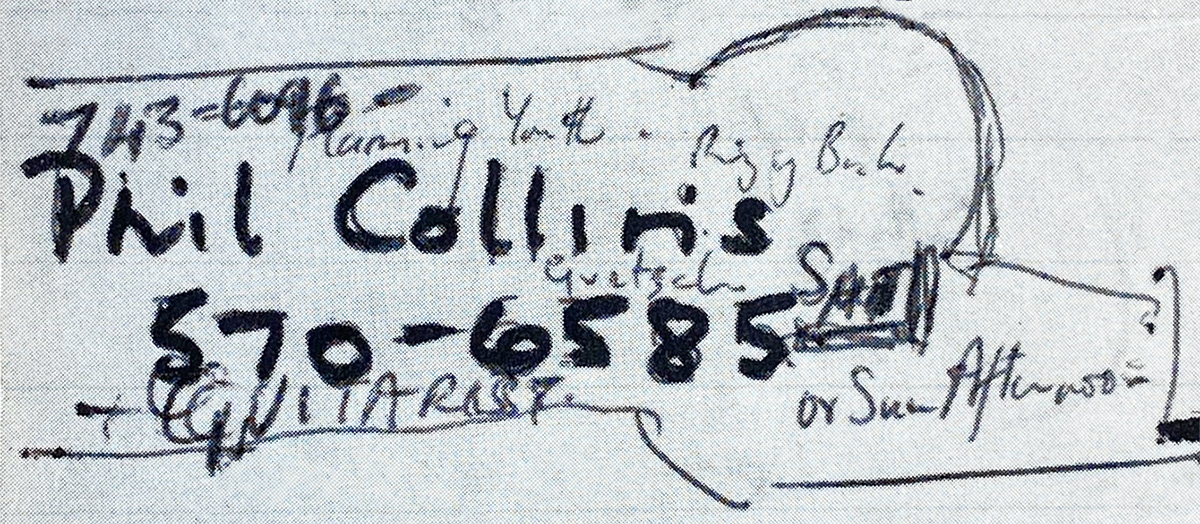
How this audition took place is well known. However, the entry in Phil Collins' diary is less well known. There he wrote on 4 August 1970: "Got Job with Genesis". This in turn proves that the audition must have taken place on the Saturday or Sunday before 4 August. Even though Collins writes in his book Not Dead Yet that the audition took place a week later and that he claims to have received Peter Gabriel's call on 8 August [6]. However, we do not consider this version to be plausible in terms of timing, as a look at the 1970 calendar and the progression of the story shows.
Ronnie Caryl, however, did not get the job as guitarist. But he was to play a small role in Genesis once again.
A few days later, before Genesis could resume their work, Phil Collins signed a contract with Charisma for £10 a week. Tony Banks, Peter Gabriel and Mike Rutherford then went on a two-week holiday.
The four of them began rehearsals on 24 August in an old building in Farnham called The Maltings. During this time, Phil stayed temporarily with Mike's parents [7].
On 2 October 1970, Phil Collins played his first concert as the new drummer with Genesis. It took place at Medway Technical College in Chatham [8].
Ronnie Caryl
However, as Genesis had not yet found a new guitarist, they initially continued as a four-man band, with Tony Banks playing the guitar parts on a distortion unit on his Hohner electric piano. But the band was to try again with Ronnie Caryl.
Ronnie told the German Genesis Fanclub in an interview in 1997: "Phil got the job straight away, but I didn't make it. But Genesis couldn't find the right guitarist straight away. So I got a call from them some time later. The result of the call is the fact that I travelled to them to rehearse with them for three or four days at Mike Rutherford's parents' house. I ended up playing a single concert with them." [9]
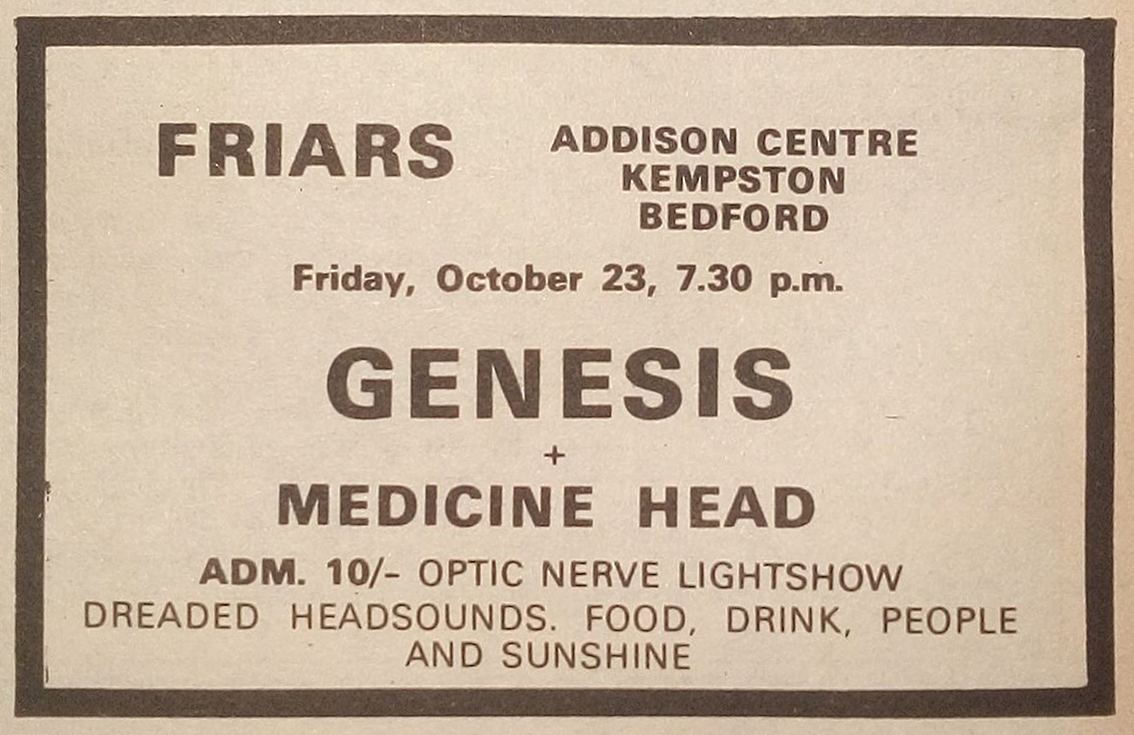 Phil Collins has said in various interviews that this concert was a Friars show, but has not mentioned the exact location. You should know that Genesis gave two concerts at a Friars in October 1970, on 6 October in Princes Risborough and on 23 October in Bedford.
Phil Collins has said in various interviews that this concert was a Friars show, but has not mentioned the exact location. You should know that Genesis gave two concerts at a Friars in October 1970, on 6 October in Princes Risborough and on 23 October in Bedford.
To understand why there may have been some confusion here, let's take a brief look at the Friars. Dave Stopps tells us about the beginning of the Friars: „On 2 June 1969 Robin, Terry Harms, Adrian Roach, John Fowler, Jerry Slater and myself presented the very first Friars Aylesbury gig at the New Friarage Hall with a post-psychedelic band called Mandrake Paddle Steamer and folk singer Mike Cooper. Two hundred people showed up and we lost £35, which was a huge sum in those days. The next week we presented The pil+ Pretty Things and the third week Free, and things started to pick up. Every Monday for the next year we presented the best bands we could get, including Black Sabbath, Edgar Broughton, Mott the Hoople, Blodwyn Pig, King Crimson, Van Der Graaf Generator and Hawkwind, to name but a few. We also did a few 'foreign' gigs in Dunstable, Bedford, High Wycombe and even one in Princes Risborough.“ [10]
A detailed list can be found on the Friar's website.
Back to the search for Ronnie Caryl's only concert with Genesis. In an interview with Phil Collins about the Genesis Archive 1967-75 box set, he finally specifies the location and names the Friars in Princes Risborough [11]. Is this the final proof? Apparently not.
For his book Inside & Out (see review here), Robin Platts managed to interview Mick Barnard, the guitarist who played with Genesis for a short time, and a session guitarist called Kim Shaheen for the first time. Thanks to Robin Platts, Mario Giammetti from Dusk was later able to speak to both of them. In February 2002, the two remarkable interviews were published in his Italian magazine (Dusk No. 38).
![Letter from 28 Oct 1970, Peter Gabriel to Kim Shaheen [B3]](media/genesis/gen_lookingforsomeone-research_img7.jpg) One thing in advance. Kim Shaheen never played a concert with Genesis. But a letter from Peter Gabriel to Kim reflects the urgent search for a guitarist. In it, Gabriel writes on 28 October 1970, among other things: „… We have not yet had the opportunity to work on your songs as we have been preparing the members for live performance as a fourpiece, but I hope they will simmer down once we are ready for the road again. We are feeling the need for a guitarist, even in the new numbers we are writing, so I hope you will let us know soon what you're plans are. We are still looking for someone amongst people over here, but as yet no-one special has turned up. I think our States tour has been put back to late in 1971 so I think you'll probably be back here before we are over in the U.S. … All the best, Peter Gabriel and the others.“
One thing in advance. Kim Shaheen never played a concert with Genesis. But a letter from Peter Gabriel to Kim reflects the urgent search for a guitarist. In it, Gabriel writes on 28 October 1970, among other things: „… We have not yet had the opportunity to work on your songs as we have been preparing the members for live performance as a fourpiece, but I hope they will simmer down once we are ready for the road again. We are feeling the need for a guitarist, even in the new numbers we are writing, so I hope you will let us know soon what you're plans are. We are still looking for someone amongst people over here, but as yet no-one special has turned up. I think our States tour has been put back to late in 1971 so I think you'll probably be back here before we are over in the U.S. … All the best, Peter Gabriel and the others.“
However, the interview with Mick Barnard is even more revealing. He tells us, for example:
„He (Dave Stopps, editor's note) introduced me to Genesis. The first time I saw them was at the British Legion Club in my town Princes Risborough (he lived there, editor's note). There was also the drummer Phil Collins who had just joined them. They were really a great band even though there were only four of them.“
![Ad, Genesis stepped in for Writing On The Wall [B4] [12].](media/genesis/gen_lookingforsomeone-research_img8.jpg)
Barnard is further quoted in Robin Platt's book Inside & Out: „I went and checked out the guitarist that was sitting in prior to me joining, Ronnie Caryl, over at Cambridge Corn Exchange.“
Asked about this in an interview with Mario Giammetti in Dusk, Mick's answer was slightly different: „That's correct. The next gig they did I went over to Cambridge to see the guitarist they had at the time. They were trying him out. I think he was from Phil Collins' band […] Ronnie Caryl, that's right. That's when I suppose realised that perhaps I could do as well. To be really truthfully honest it wasn't really the music that I was into. But I did like them very much at the local British Legion. Very dynamic, very forceful and excellent sound. They had no guitarist at that time.“
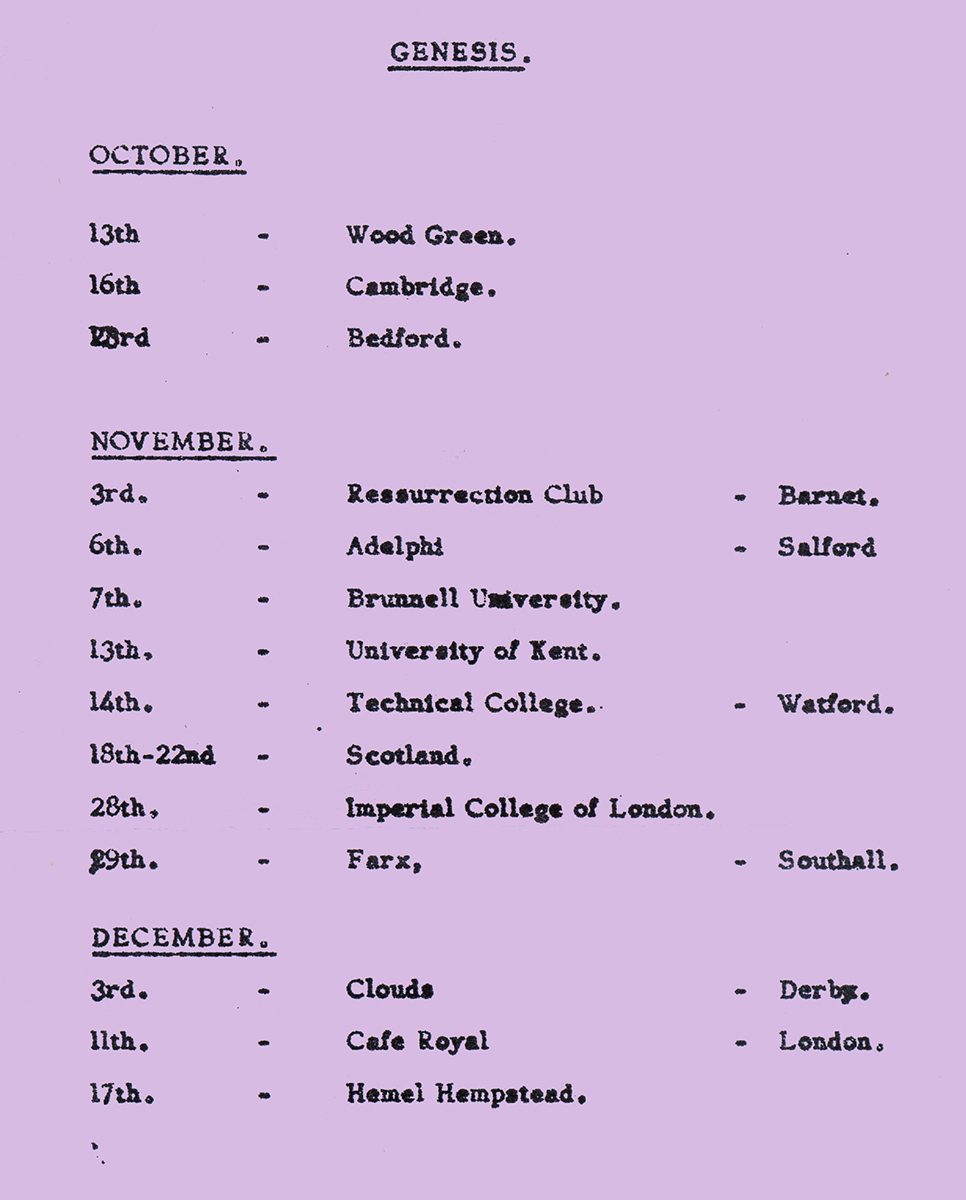 The contradictory statements by Phil Collins and Mick Barnard cannot be conclusively clarified at present. According to their itinerary, a concert was planned for 16 October in Cambridge, but we have not found an advert for the Corn Exchange on that date. However, it is mentioned in various tour date listings that the band played at the Rex Cinema as support act for Matthews Southern Comfort. Matthews Southern Comfort were a band who, like Genesis, had also appeared on the BBC's Disco 2 programme and also had a number 1 hit with their single Woodstock in October/November 1970. We have two adverts for Matthews Southern Comfort at the New Rex Cinema, but unfortunately without any mention of Genesis, which is no proof as to whether Genesis played there that day or not.
The contradictory statements by Phil Collins and Mick Barnard cannot be conclusively clarified at present. According to their itinerary, a concert was planned for 16 October in Cambridge, but we have not found an advert for the Corn Exchange on that date. However, it is mentioned in various tour date listings that the band played at the Rex Cinema as support act for Matthews Southern Comfort. Matthews Southern Comfort were a band who, like Genesis, had also appeared on the BBC's Disco 2 programme and also had a number 1 hit with their single Woodstock in October/November 1970. We have two adverts for Matthews Southern Comfort at the New Rex Cinema, but unfortunately without any mention of Genesis, which is no proof as to whether Genesis played there that day or not.
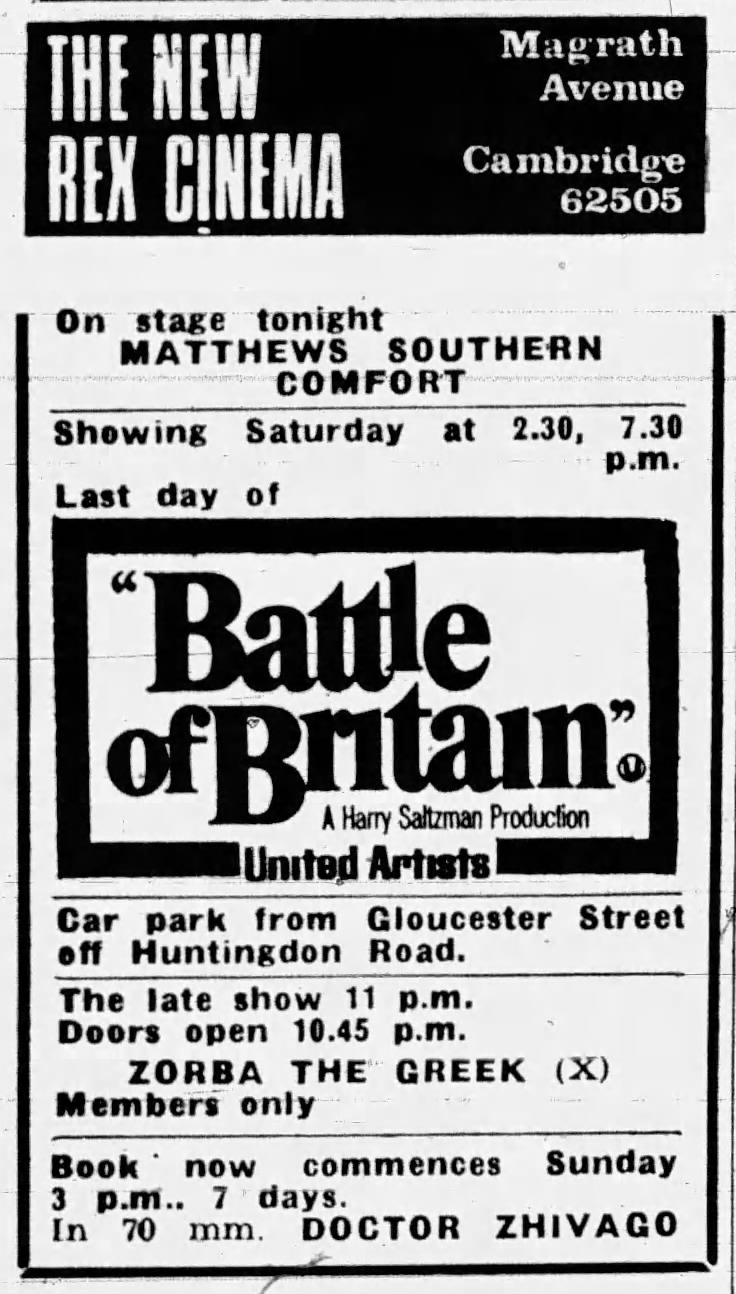 However, there is no doubt that Ronnie Caryl only played one concert with Genesis. Most probably in the short period from 7 October to 17 October 1970. The rest of the story will explain this.
However, there is no doubt that Ronnie Caryl only played one concert with Genesis. Most probably in the short period from 7 October to 17 October 1970. The rest of the story will explain this.
Mick Barnard
Genesis were still travelling as a four-man band and were still looking for a suitable guitarist. So it was very convenient that Dave Stopps introduced them to someone. Tony Bank confirms this: "We played a lot at Friars in Aylesbury, which was a great venue for us throughout this period and we were friendly with Dave Stopps who ran it. He suggested we try Mick Barnard, who was a guitarist in a local group called the Farm. We auditioned Mick and liked his style." [13]
These rehearsals took place in mid-October 1970. Most probably in the period from 18 October to 1 November 1970, an otherwise concert-free period that was used to prepare for the Trespass tour and to rehearse the new tracks on the album. Rehearsals were interrupted only by a single concert on the 23rd at Friars in Bedford, the day Trespass was released.
On 31st October and 1st November Genesis were to take part in the 2nd Grand Benefit Festival at Sussex University in Falmer (Brighton). A poster and a flyer are available. Whether they actually played there on one of the two days is disputed. It is possible and understandable that the gigs were cancelled in favour of further rehearsals with Mick Barnard.
If this was the case, which we assume it was, the first concert with Mick Barnard as guitarist would have taken place on 3 November at the Resurrection Club in Barnet. Unfortunately, we have not yet found any evidence in favour of either version.

Mick talks about his memories of the first concert and the time he played with Genesis in Dusk No. 38: „Not really. No I can't. There was a very busy period. I have got some documentation and some cuttings and things but I couldn't give you the precise gig. I know my last gig.
Oh yes I remember some of the gigs. Particularly places like Heriot-Watt University during the tour of Scotland, and Farx Club - I remember that quite well. And The Lyceum. I'm pretty sure I did one of the Lyceum shows. The ones that I remember the most are the ones which are on my little yellow sheet which Tony Stratton Smith used to give us. He would never spell Genesis correctly, he would put Genisis.“
 And when asked about Genesis' first TV appearance, on a programme called Disco 2 [14], Mick answers in the same interview in Dusk: „Yes. Very much so. It was quite a job. We actually had to take some equipment which was silly as we weren't playing it. Yes they did a nice backdrop which from our point of view was blue and they superimposed some war scenes on it. When that was broadcast we were playing in Watford Town Hall supporting Johnny Winter. And I rushed back because that was not too far from my house and I just managed to get in my house to see us performing on Disco 2. But I've never been able to trace that copy. I'd love to have found a copy of that. I tried for months through the BBC but apparently all copies have been deleted. Does anybody have a copy?“
And when asked about Genesis' first TV appearance, on a programme called Disco 2 [14], Mick answers in the same interview in Dusk: „Yes. Very much so. It was quite a job. We actually had to take some equipment which was silly as we weren't playing it. Yes they did a nice backdrop which from our point of view was blue and they superimposed some war scenes on it. When that was broadcast we were playing in Watford Town Hall supporting Johnny Winter. And I rushed back because that was not too far from my house and I just managed to get in my house to see us performing on Disco 2. But I've never been able to trace that copy. I'd love to have found a copy of that. I tried for months through the BBC but apparently all copies have been deleted. Does anybody have a copy?“
In the search for further evidence of Barnard's time with Genesis, unfortunately not much can be found in the music press. On the one hand, there is an article by Jerry Gilbert in the music magazine Sounds from 26 December 1970, which reports on the concert on 20 December in Godalming and also mentions Mick.
Two other articles also discuss the change of personnel to Phil Collins and Mick Barnard. Ironically, these two articles only appeared at a time when Mick Barnard was no longer part of the band [15 + 16].
The report of an eyewitness to the concert on 16 December 1970 in Aylesbury is also interesting: „Yes Genesis did play a show at Aylesbury Grammar School with Mick Barnard. I know as I was there. Admittance was for the schools pupils only so I took a microphone with me and without missing a beat I waved it at the door manager saying 'roadie' and walked straight in.
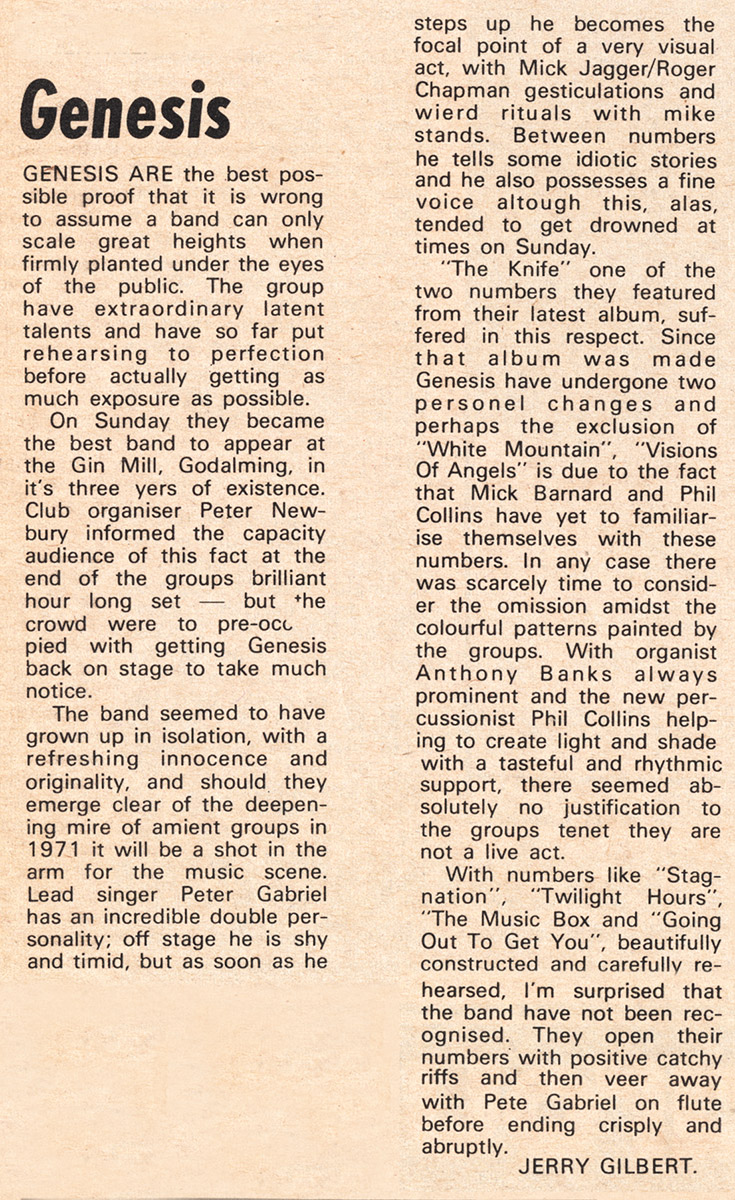 I saw them a few weeks later at Aylesbury college with Hackett. Long after the gear was packed up I remember the band sitting in the middle of an empty hall and Collins saving 'I never want to hear the name Farm ever again. Talking of Farm, I saw many concerts by them. They were a wonderful band that included drummer Paul Hammond who replaced Carl Palmer in Atomic Rooster and bassist Nigel Harrison who played in Silverhead, Blondie and Chequered Past.“ [17]
I saw them a few weeks later at Aylesbury college with Hackett. Long after the gear was packed up I remember the band sitting in the middle of an empty hall and Collins saving 'I never want to hear the name Farm ever again. Talking of Farm, I saw many concerts by them. They were a wonderful band that included drummer Paul Hammond who replaced Carl Palmer in Atomic Rooster and bassist Nigel Harrison who played in Silverhead, Blondie and Chequered Past.“ [17]
Mick Barnard's time with Genesis came to an abrupt end on 5 January 1971 in High Wycombe, directly after the concert where Mick's old band Farm was, piquantly, the support act. Mick recalls in Dusk as follows: „I went there with Genesis and obviously I thought I was in Genesis. The support band was my old band Farm. They had a new singer and a new guitarist. We did the gig, we went down quite well. At the end of the gig Peter called me to have a talk in the back of the van. It was just Peter Gabriel and me. I think the rest of them were having a drink and that's where he explained to me that they had got another guitarist. He said they'd get my Binson Echo Unit which was faulty, repaired and paid for.“
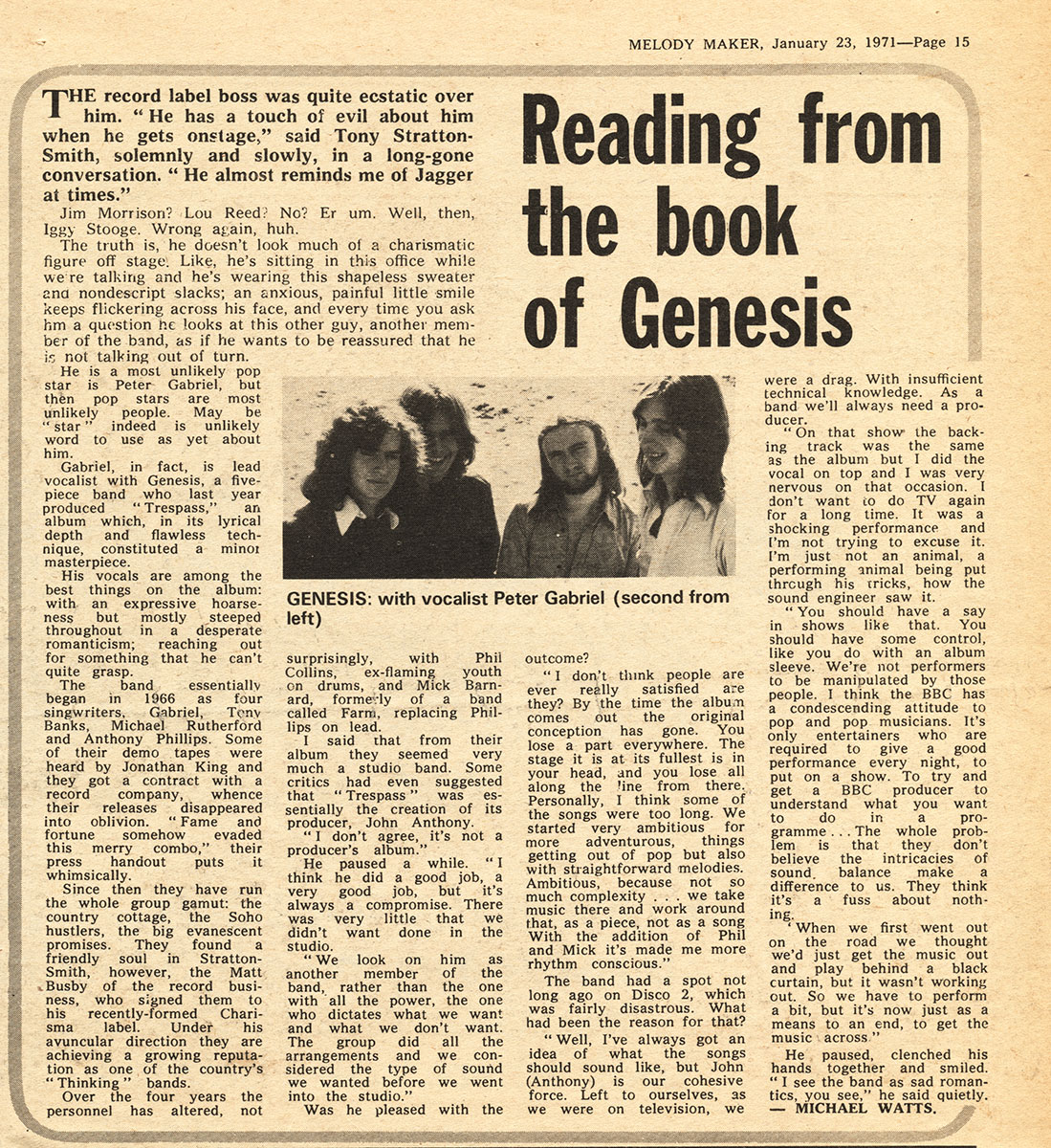 When asked if Mick ever felt part of the band, he continued in the Dusk interview: „No I don't think so. I pretty much tried and tried to get them to say if I was in or out because I had really dropped my career to be with them. I didn't think I was going to be in the band that long obviously not knowing what success was to come. I don't feel cheated by anything. It was just a very nice experience at that time. I feel that they could have been a little bit more honest with the situation but they just kept saying "we'll let you know.“ [18]
When asked if Mick ever felt part of the band, he continued in the Dusk interview: „No I don't think so. I pretty much tried and tried to get them to say if I was in or out because I had really dropped my career to be with them. I didn't think I was going to be in the band that long obviously not knowing what success was to come. I don't feel cheated by anything. It was just a very nice experience at that time. I feel that they could have been a little bit more honest with the situation but they just kept saying "we'll let you know.“ [18]
At first glance, the timing of the end seems strange, as Genesis then had to play a few more concerts as a foursome. But not for long ...

Steve Hackett
For five years after leaving school, 20-year-old Stephen Richard "Steve" Hackett placed an advert in the music magazine Melody Maker, which initially read: "Blues guitarist / harmonica player seeks work". As he became acquainted with new, innovative music, his taste and interest in music expanded. Hackett was fascinated by the variety of possibilities.
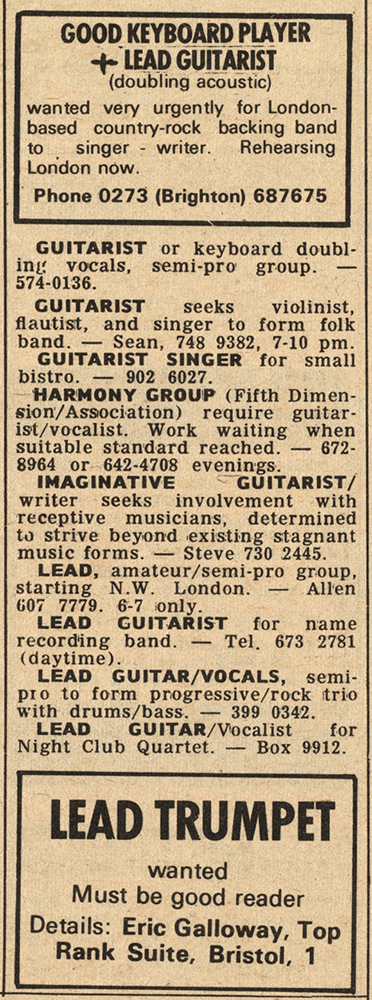 In 1970, the famous advertisement in the Melody Maker of 12 December read: "Imaginative Guitarist/writer seeks involvement with receptive musicians, determined to strive beyond existing stagnant musical forms – Steve".
In 1970, the famous advertisement in the Melody Maker of 12 December read: "Imaginative Guitarist/writer seeks involvement with receptive musicians, determined to strive beyond existing stagnant musical forms – Steve".
Hackett says: „It was a bold statement suggesting high expectations of both myself and anyone I was to work with, but it must have had the right tone, as it attracted the attention of another like-minded idealist.“
And indeed, the like-minded idealist became aware of the advert. Steve writes in his book A Genesis In My Bed: „It was one of those grey late Autumn days when I was back in my bedroom practising guitar licks, after helping Mum to take stuff out to the bin in the yard and dreaming of a rosy distant future, when the phone rang. "Hello, my name is Peter Gabriel. I've just read your ad...“ [19]
Banks and Gabriel initiated an informal audition at Hackett's family home in the Victoria area of London, a flat far removed from the leafy climes of Surrey. Steve remembers it: „I hurtled through some pieces for Pete and Tony alone and with my brother John on things written for guitar and flute. I could also play a bit of blues with my harmonica whilst John strummed along. One of the numbers we touched on, 'The Hermit', was to appear later on Voyage of the Acolyte. I played both electric and acoustic guitar, and it helped that I also played twelve string. My love of all three kinds of guitar put me in very good stead with the guys. I think they liked my eclectic approach and my interest in all styles of music. Had I realised I was competing with about forty other guitarists I would have been a lot more nervous.“ [20]
Before Steve Hackett joined Genesis, he saw them at the Lyceum on 28 December 1970 (with Mick Barnard, at one of his last shows with Genesis): „Before I joined Genesis, I saw them at the Lyceum. I was impressed and I was aware I had a lot to learn to keep up with them, but I was aware there were ideas I could give them.“ [21]
The first rehearsal with the band took place in West Hampstead. Hackett realised that he not only had to learn the songs, but also the Genesis jargon. They had their own language and shared experiences that seemed foreign to him.
He says of these impressions: „They had an air of reserve too, which often left me wondering what they were thinking. They were patient with me though, and Richard Macphail who was always on hand to support us as close friend, roadie and in-house therapist was very reassuring. He said my attitude was right because I wanted to improve. […] The band's music fascinated me. At this point, it was as much acoustic as electric, with elements of heavy rock in occasional bursts of frenzy.“ [22]
The first concert Steve played with Genesis was at London City University on 14 January 1971.
Phil Collins remembers this gig as a minor disaster: "Mostly, the gigs are conducted in a fairly professional manner: get there, get on, get back. A few joints but no bawdy bacchanalia. The closest we get to that is at a show at London' City University, which happens to be Steve's first gig with Genesis. Our stage time is later than advertised so I pass the time by sinking a few Newcastle Browns. By the time we're onstage, I'm all over the place, literally. I do all the right fills but do them three inches to the right of each drum. Forget air-guitar, this is air drums. Afterwards, I'm wincing: "What must this new guitarist think? First gig and the drummer's pissed.' That is the first time I'm ever drunk playing, and it will be the last." [23]
But even the new guitarist was not satisfied with the performance: „The London University gig was a baptism of fire. I wasn't used to doing live gigs at that stage, the material was new for me and there was so much to get right. I used a Rose Morris Shaftes-bury Duofuzz. I couldn't stop it feeding back, which threw me, and I played so many bum notes. I wanted to crawl off the stage and die. I was convinced they were going to sack me. But no one complained. Revelation... The aliens had sympathy! They could see what was going on and were giving me a new chance.“
The next gigs went better and Steve remembers that: „The gig in Bangor, Wales, where The Beatles had travelled to see the Maharishi, was a much easier experience. Very few people showed up but now I had a Marshall Superfuzz which worked, and I played sufficiently well to redeem myself. I was happy to get through it and I passed the test.
The show at the Lyceum was terrifying, as it was such an important venue. My mother said I looked green! But I did okay, and the show was well attended. I was still so nervous that I forgot to walk off stage at the end and Richard had to lead me off! "It's over now Steve" he said with a gentle smile. Once I was backstage and normalising, I realised I'd passed the test. This was what I'd been building up to all these years and it was working!“ [24]
This marked the beginning of a new era for Genesis, and the classic phase with Tony Banks, Phil Collins, Peter Gabriel, Steve Hackett and Michael Rutherford.
Author: Peter Schütz
Editing: Alex Sturm and Helmut Janisch
Research: Peter Schütz and Alex Sturm
Special thanks go to Mario Giammetti from Dusk for his help!

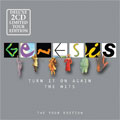

Turn It On Again - The Hits brings all "short" milestones onto one double-album.
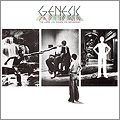

Legendary Double album from 1974, now available remastered on 2CD with new Stereo-Mixes.
Review available